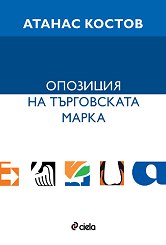
Mr.Atanas Kostov - trademark attorney in Bulgaria. The book "Opposition of the trademark"".
The book "Opposition of the trademark" reviews the new procedure for refusal of registration on relative grounds, which came into force with the latest amendments to the Law on Marks and Geographical Indications (LPMO) of 10.03.2011. Writing the book aims to make it useful to a wide range of lawyers, patent attorneys, industrial property representatives, commercial subjects, students, and citizens to give more clarity about the opportunities for opposition that the opposition offers. Most of the material in the book is a synthesis of theory and practice, primarily of OHIM and of the Court of Justice of the European Communities, mainly due to a lack of national practice for the time being, this approach being chosen to shed light on the specifics of the procedure not only on a national but also on a European scale. I believe that the judgments of the Court of Justice of the European Communities, as set out in detail, with clearly defined legal criteria relating to the opposition, would be directly applicable in practice and law enforcement in Bulgaria, not only because of their priority importance for Bulgarian legislation, but above all in relation to the competent legal opinions they actually offer.
For the reasons given, the introduction of the opposition procedure, in my opinion, is the result of a positive legislative initiative of the Bulgarian Patent Office. However, the opposition puts forward a number of theoretical and practical issues that will still be looking for its right solution. Dynamically evolving market realities and related legislative processes on a national and European scale have called for modern mechanisms to identify real-life traders in a particular business area, including intellectual property, in particular trademarks. I say this for several reasons. Firstly, because some of the registered trademarks in Bulgaria do not have any real commercial interests, they are registrated for themselves (in most cases for commercial purposes) and should be dropped as unusable for the reasons mentioned. Second, many unscrupulous practices are being monitored, which must be pirated at the trademark registration phase - a claim by the proprietor of the trademark owner, or a misappropriation of trade marks already entered but unregistered. Thirdly, competitive relations require continuous control efforts by applying appropriate legal measures to potential competitors - for example restricting the application of similar trademarks for identical or similar goods and services. Last but not least, the procedure in the Patent Office itself will be optimized by avoiding the subjective factor in the process of expertise, as until now the similarity as a relative ground for trademark denial was followed by a specific expert at the Patent Office, which was the case file of the respective trademark was distributed and this decision depended on his subjective opinion. Thus, marketers will be self-regulators of their own rights with respect to their registered and correspondingly trademarked trademarks, thus giving preference to a more practical and at the same time democratic approach to marketers. All this will, in my opinion, lead to a more efficient work of the Patent Office itself, which will significantly optimize its administrative potential.